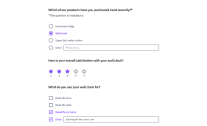Table Content
A basic definition of surveys
The goal hereby is to analyse and evaluate the retrieved data to extract certain knowledge about different research topics or fields with respect to demography. More specifically, this data is used to draw conclusions about the attitude of a specific population by questioning a smaller sample group. Essential for this endeavour is that the questioned sample is representative of the population, otherwise no statistical inference is possible and the generalisability becomes invalid.
Survey methodology
The sample selection is an essential task in order to be able to generalise findings to a population of interest in the later stages of survey conduct. A list of members of a population has to be filtered for a representative sample group without selection bias to reach said generalisability, i.e. avoiding under- or overrepresentation of elements (population members) within the sample group.
The survey data collection approach is largely dependent on specific factors such as costs of survey conduct with an approach, coverage of the population of interest with an approach, flexibility of question design with an approach, participation willingness with an approach and response accuracy with an approach. Mixing different data collection approaches can lead to a so-called mode effect which will ultimately lead to different results when comparing different data collection modes within a survey.
Application examples for surveys
Market research surveys:
Market research is initiated by organisations to gain insights into certain target markets/industries and consumer behaviour/attitude. It provides information on market structures, size and demand as well as the competitor situation. This information is important for marketing products successfully.
Market research can be conducted either through primary research which can be subdivided into quantitative and qualitative research as well as through secondary research.
The latter approach draws on reusing data collected by others to work with.
Qualitative primary research focuses on gathering information only on specific cases at hand without drawing conclusions about a general population. It includes techniques such as in-depth interviews, case studies, focus groups, observation etc...
Quantitative primary research provides the possibility of testing theories and hypotheses for empirical evidence. This may allow for generalised insights into human behaviour and opinions from sample groups to entire populations in an unbiased scenario. In order to receive a representative sample size, quantitative research relies on the conduct of surveys to attain the mathematical database for statistical analyses. This method is widely deployed in fields such as economics, business/marketing, psychology, sociology, political science and medical health care.
Political surveys/ Polls:
Polls, especially used in a political context of democratic participation rights, are used to enable groups of people who act within a common arrangement to vote on topics that express their opinions or help make decisions. In politics, polls are conducted to elect holders of political offices. These polls take place in the same way surveys are executed under equal conditions of data secrecy, security and anonymity.
Political polls can be aforementioned election polls for filling offices in the legislature, executive or judiciary of state, regional and local governments or straw polls/opinion polls that are ad-hoc in nature and give unofficial, spontaneous popular public opinions on political matters by vote.
Polls can be held in official polling places with traditional paper-and-pencil surveys as well as on the internet with online surveys. Either of these polling methods can be subject to electoral fraud or manipulation and must therefore take the necessary data security measures to prevent malicious intents.
Educational research surveys:
Educational research can cover anything from administration-based or structural surveys, for example, university reviews, evaluation of courses, lectures or seminars, professor and lecturer assessments, to project- or thesis-based surveys, for example, surveys for seminar papers, bachelor-, master-, diploma- or doctoral thesis.
Depending on the insights that are to be generated, educational surveys can be conducted with all the aforementioned questioning approaches, although paper-and-pencil, as well as online surveys, are largely favoured among students.
Customer satisfaction and employee feedback surveys:
Customer satisfaction surveys and employee feedback surveys are the most commonly performed surveys within organisations to improve company processes, structures, products and services. These are the utmost important factors for companies to remain competitive and grow by gaining information on internal blind spots and aspects that underlie insufficient quality and efficiency.
This data is incredibly helpful in building stronger and better relationships with customers and employees alike which may positively impact customer lifetime values and employee retention rates.
Concluding remarks





